|
|
|
Sort Order |
|
|
|
Items / Page
|
|
|
|
|
|
|
| Srl | Item |
| 1 |
ID:
187030
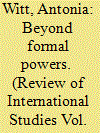

|
|
|
|
|
| Summary/Abstract |
International organisations (IOs) are said to command growing levels of authority. But in studying this phenomenon, scholars predominantly focus on the formal capacities member states assign to IOs. Much less attention is paid to the effects of IO authority, that is, how authority is exerted in practice and what it does within the affected societies. Based on a case study of the African Union's (AU) anti-coup regime, I make the case for a ‘bottom-up’ approach to IO authority, focusing on its localised enactment and effects. Analysing the AU's authority through a governmentality lens and drawing on several months of field research, I show that the AU's authority to govern coups is indeed effective: in commanding the re-establishment of constitutional order, the AU prescribes a particular imaginary of political order to resolve conflict and shapes the conduct of political actors in affected states by inscribing them into this order. But rather than operating in a top-down, direct way, the AU's authority is enacted in a distant, diffuse manner. Although based on formal powers assigned to the AU, neither the way this authority is exercised nor its effects can be inferred merely from these formal powers.
|
|
|
|
|
|
|
|
|
|
|
|
|
|
|
|
| 2 |
ID:
104969
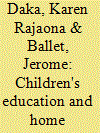

|
|
|
|
|
| Publication |
2011.
|
| Summary/Abstract |
Assessments of the impact of electrification on the quality of life of households in developing countries have increased over the last decade. One aspect that has still received little attention is education and the ability of children to keep up at school. The underlying hypothesis is that electrification enables children to do their homework in the evening and so keep up with their school work. To this first hypothesis we add a second one, concerning the relation between access to electricity and attendance to school according to gender. Although most household tasks are carried out by the mothers, their daughters are also involved, and electrification could have a beneficial effect by making easier for girls to do their homework in the evening and easier for the mothers to help them. We will check the validity of these hypotheses using a case study of 162 children attending school in a small town in northwestern Madagascar.
|
|
|
|
|
|
|
|
|
|
|
|
|
|
|
|
| 3 |
ID:
045508


|
|
|
|
|
| Publication |
Cambridge, Cambridge University Press, 1986.
|
| Description |
xx, 1063p.: maps, figures, tableshbk
|
| Contents |
Vol. VII: From 1905 to 1940
|
| Standard Number |
0521225051
|
|
|
|
|
|
|
|
|
|
|
|
Copies: C:1/I:0,R:0,Q:0
Circulation
| Accession# | Call# | Current Location | Status | Policy | Location |
| 028110 | 960/ROB 028110 | Main | On Shelf | General | |
|
|
|
|
| 4 |
ID:
180894
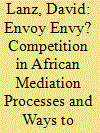

|
|
|
|
|
| Summary/Abstract |
This article seeks to make sense of the dynamics of competition in African mediation processes and to outline approaches for effective cooperation between mediators. To this end, it analyzes four cases of recent peace processes: Sudan (1994–2005), Kenya (2008), Madagascar (2009–2013) and South Sudan (2013–2015). The article identifies four driving forces of competition among mediators: clashing interests of states involved in mediation, overlapping mediation mandates, incompatible norms guiding conflict resolution, and mediators’ lack of performance. These factors risk undermining peace processes unless the involved mediators and guarantors take active steps to mitigate the negative effects of competition. This can be done through ‘hierarchical coordination,’ where a recognized authority takes the lead and allocates roles to other actors, or through ‘collaborative cooperation,’ where partners have unity of purpose and decide on a division of labor based on comparative strengths.
|
|
|
|
|
|
|
|
|
|
|
|
|
|
|
|
| 5 |
ID:
087805
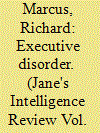

|
|
|
| 6 |
ID:
180626
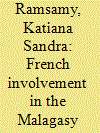

|
|
|
|
|
| Summary/Abstract |
In March 2009, President Marc Ravalomanana of the Island of Madagascar was ousted during a coup d’état led by the Mayor of Antananarivo, Andry Rajoelina, and his supporters. After the coup, Ravalomanana and his family fled to South Africa where they remained in exile from 2009 to 2014. To restore constitutional order in Madagascar, the Southern African Development Community (SADC), in July 2009, took the lead in a mediation process involving all Malagasy and other key stakeholders. SADC’s mediation efforts, led by former President Chissano, formally ended in 2013 with the holding of democratic elections. The mediation effort, which lasted five years, was conducted in a very competitive and ‘crowded’ field. The ‘crowded’ field was characterised by in-fighting amongst the various international bodies for power and influence including ‘spoiler’ tactics used by vested interests to hinder the mediation process and prevent the return of Ravalomanana to Madagascar. This article looks specifically at the ‘spoiler’ role that France played during the mediation process to safeguard her interests in Madagascar under the Sarkozy Administration. France is known to intervene in the political and economic affairs of her former colonies and, during the 2009 coup, this was no exception.
|
|
|
|
|
|
|
|
|
|
|
|
|
|
|
|
| 7 |
ID:
142058
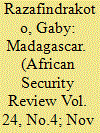

|
|
|
|
|
| Summary/Abstract |
Despite a constitution that condemns discrimination, as well as positive efforts by all stakeholders, Madagascar is still far from meeting the desired objectives of the Southern African Development Community (SADC) Protocol on Gender and Development, or any other relevant international instruments and conventions. The establishment of an Organising Technical Committee on security sector reform for Madagascar is a positive development, which will hopefully facilitate an understanding of the multiple facets of gender and security in Madagascar as well as advancing the implementation of the instruments calling for greater female participation in the security sector.
|
|
|
|
|
|
|
|
|
|
|
|
|
|
|
|
| 8 |
ID:
019260
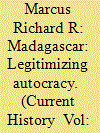

|
|
|
|
|
| Publication |
May 2001.
|
| Description |
226-231
|
|
|
|
|
|
|
|
|
|
|
|
|
|
|
|
| 9 |
ID:
120368
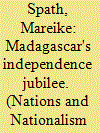

|
|
|
|
|
| Publication |
2013.
|
| Summary/Abstract |
The fiftieth anniversary of Madagascar's independence in 2010 took place in the midst of political crisis. The transitory government staged large public parties to mark the Jubilee. Despite a public discussion about legitimacy and justification of this fact, the national holiday was lavishly celebrated. In Madagascar, Independence Day is also an important family event and emphasis was put on private celebrations including family feasts and reunions. As a result, it enhanced the participants' emotional attachment to their personal and local face-to-face milieu. This article asks how the golden jubilee was celebrated against a backdrop of political illegitimacy. I contrast official state-led initiatives and individual agency in the private sphere and discuss how the national holiday has been appropriated and reinterpreted by the population as a family and community holiday. This article is based on qualitative ethnographical fieldwork in Antananarivo before, during and after the peak of the independence jubilee.
|
|
|
|
|
|
|
|
|
|
|
|
|
|
|
|
| 10 |
ID:
096160
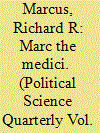

|
|
|
|
|
| Publication |
2010.
|
| Summary/Abstract |
Examines the roots of Madagascar's President Marc Ravalomanana's power and how they grew in leadership and regime expression. He argues that the private sector came to substitute for the bureaucracy, military, and other common bases of neopatrimonial rule thus allowing Ravalomanana to create a personalized economic-political fusion in a democratic context. This ultimately contributed to his downfall.
|
|
|
|
|
|
|
|
|
|
|
|
|
|
|
|
| 11 |
ID:
104991
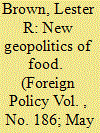

|
|
|
|
|
| Publication |
2011.
|
| Summary/Abstract |
In the United States, when world wheat prices rise by 75 percent, as they have over the last year, it means the difference between a $2 loaf of bread and a loaf costing maybe $2.10. If, however, you live in New Delhi, those skyrocketing costs really matter: A doubling in the world price of wheat actually means that the wheat you carry home from the market to hand-grind into flour for chapatis costs twice as much. And the same is true with rice. If the world price of rice doubles, so does the price of rice in your neighborhood market in Jakarta. And so does the cost of the bowl of boiled rice on an Indonesian family's dinner table.
|
|
|
|
|
|
|
|
|
|
|
|
|
|
|
|
| 12 |
ID:
099706
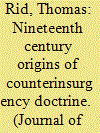

|
|
|
|
|
| Publication |
2010.
|
| Summary/Abstract |
In counterinsurgency, the population is the center of gravity. This insight has become a key doctrinal tenet of modern armed conflict. But where does it come from? The razzia, a tactic introduced by the French in North Africa around 1840, first thrust tribal populations into the focus of modern operational thinking. Soon the pioneering bureaux arabes added an administrative, civil, and political element. Eventually, in the 1890s, French operations in Madagascar gave rise to a mature counterinsurgency doctrine. David Galula, a French writer who heavily influenced the American Counterinsurgency manual, is merely the joint that connects the nineteenth century to the twenty-first.
|
|
|
|
|
|
|
|
|
|
|
|
|
|
|
|
| 13 |
ID:
128184
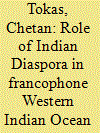

|
|
|
|
|
| Publication |
2014.
|
| Summary/Abstract |
Western Indian ocean islands of Seychelles, Mauritius, Madagascar, Reunion and Comoros have played significant role in migration of people and flow of goods across Indian Ocean for centuries. European powers in order to control sea lanes had firmly worked on acquiring military significance over the Western Indian Ocean region during colonial era. Revolution, Comoros, Madagascar, Seychelles and Mauritius have remain French colonies or were occupied by France for certain period of time.
|
|
|
|
|
|
|
|
|
|
|
|
|
|
|
|
| 14 |
ID:
082668
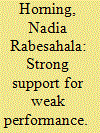

|
|
|
|
|
| Publication |
2008.
|
| Summary/Abstract |
Since independence, Madagascar's ability to meet its development and environmental goals has remained weak. Yet Madagascar has never suffered a shortage of foreign assistance. What explains such a paradox? This article argues that the gap between foreign aid and development performance is rooted in donor competition to give aid for the purpose of advancing their foreign interests. In turn, the state exploits this donor competition to stay afloat. This process of exploiting aid creates a situation of mutual dependency between donors and the state. This is a departure from theories that attribute poor performance solely to recipient countries' aid dependency. The article examines state-donor relations in Madagascar's environmental sector in the past two decades. It suggests that influencing government policies (for donors) and resource capture and redistribution (for the state), rather than conservation per se, are the de facto goals of conservation politics. It then assesses the extent to which the dynamics of conservation politics apply beyond this specific arena. It concludes that what disables successful conservation and the development it should enable is neither the volume nor type of foreign aid but the absence of institutions that effectively align donor and state incentives with strong development performance
|
|
|
|
|
|
|
|
|
|
|
|
|
|
|
|
| 15 |
ID:
129150
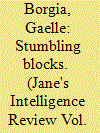

|
|
|
| 16 |
ID:
102782
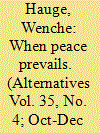

|
|
|
| 17 |
ID:
165230
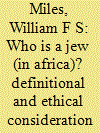

|
|
|
|
|
| Summary/Abstract |
In recent decades, the fulcrum of African Jewry has shifted from long-established Ethiopian communities to emerging ones in West and Central Africa. This transition from “old” to “new” expressions of Judaism in Africa reanimates the question, “Who is a Jew?” The matter is problematized by the existence of multiple and diverse communities who purport Israelite lineage but eschew normative Judaism. This article offers a “concentric circles” model to bring conceptual and theological clarity to this issue. The outer circle or ring includes African “tribes” (as the term is used by African themselves) that claim ancient Hebrew lineage but still subscribe to institutionalized Christianity (Protestant or Catholic) or indigenous belief systems (animist or ancestral), or a combination of these. A middle circle or ring encompasses groups that have modified their practices and beliefs to resemble Jewish or Israelite religion but in fundamentally non-normative ways (e.g., practicing priestly sacrifice or retaining Jesus Christ as a Messianic touchstone). The core ring represents those African communities that do adopt normative Judaism, albeit with Africanized accretions. Some scholarly consensus regarding the legitimacy of wide-ranging claims to Jewish identity in Black Africa is critical to the analytical and ethical integrity of the study of African Judaism.
|
|
|
|
|
|
|
|
|
|
|
|
|
|
|
|
|
|
|
|
|